100 Greatest Britons

 Clash Royale CLAN TAG#URR8PPP
Clash Royale CLAN TAG#URR8PPP
The 100 Greatest Britons was a television series broadcast by the BBC in 2002. It was based on a television poll conducted to determine who the British people at that time considered the greatest Britons in history.[1][2] The series included individual programmes featuring the top ten, with viewers having further opportunity to vote after each programme.[3] It concluded with a debate and final determination of the ranking of the top ten. Although many living people were included among the top 100, all of the top ten were deceased.
Contents
1 The Poll
2 Top 10 on the list
3 Full list
4 See also
5 References
6 External links
The Poll
The poll resulted in nominees including Guy Fawkes, who was executed because of his role in the murderous plot to blow up the Parliament of England; Oliver Cromwell, who created a republican England; Richard III, suspected of murdering his nephews; James Connolly, an Irish nationalist and socialist who was executed by the Crown in 1916; and a surprisingly high ranking of 17th for actor and singer Michael Crawford (the second highest-ranked entertainer, after John Lennon). Diana, Princess of Wales was judged to be a greater historical figure than Isaac Newton, William Shakespeare, and Charles Darwin by BBC respondents to the survey.
One of the more controversial figures to be included on the list was occultist Aleister Crowley. His works had a direct influence on the rise in popular occultism and some forms of neopaganism in the 20th century. In addition to the Britons, some notable non-British entrants were listed, including two Irish nationals, the philanthropic musicians Bono and Bob Geldof. The top 19 entries were people of English origin (though Sir Ernest Shackleton and Arthur Wellesley, 1st Duke of Wellington, were both born into Anglo-Irish families when what is now the Republic of Ireland was part of the United Kingdom). The highest-placed Scottish entry was Alexander Fleming in 20th place, and the highest Welsh entry was Owain Glyndŵr in 23rd place.[4] Sixty had lived in the 20th century. The highest-ranked living person was Margaret Thatcher, placed 16th.[5]Ringo Starr was the only member of The Beatles not on the list. Isambard Kingdom Brunel occupied the top spot in the polls for some time thanks largely to "students from Brunel University who have been campaigning vigorously for the engineer for weeks."[6] However, a late surge in the final week of voting put Churchill over the top.[6] Of the top 100, 13 were women.
The opening and closing ceremonies of the 2012 Summer Olympics featured the two greatest Britons, Isambard Kingdom Brunel and Winston Churchill as main characters, played by Kenneth Branagh and Timothy Spall, each of them reading a monologue from William Shakespeare's The Tempest.[7][8] The ceremony also included a personal appearance by Tim Berners-Lee,[9] who was placed 99th on the list. There were no black Britons on the list, prompting a separate three-month survey to find the 100 greatest black Britons.[10][11]
Top 10 on the list
| Rank | Name | Notability | Advocate | Ref. | |
|---|---|---|---|---|---|
| 1 | Sir Winston Churchill | 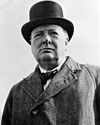 | Prime Minister (1940–1945, 1951–1955). Historically ranked as one of the greatest British prime ministers. Led the nation during World War II, when the country had to defend itself against Hitler's attempts to invade. He was an important figure in post-war national and international politics. Received the Nobel Prize in Literature in 1953. | Mo Mowlam, British politician.[12] | [13] |
| 2 | Isambard Kingdom Brunel |  | Mechanic and Civil engineer, designer of the Great Western Railway, Clifton Suspension Bridge, SS Great Britain and numerous significant ships, tunnels and bridges. A prominent figure during the Industrial Revolution which began in Britain, he revolutionised public transport and modern engineering.[14] | Jeremy Clarkson, TV presenter.[12] | [13] |
| 3 | Diana, Princess of Wales | 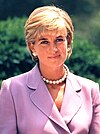 | First wife of Charles, Prince of Wales (marriage 1981–1996), and mother of Prince William, Duke of Cambridge, and Prince Harry, Duke of Sussex. Admired for her philanthropic deeds. | Rosie Boycott, journalist and feminist activist.[12] | [13] |
| 4 | Charles Darwin | 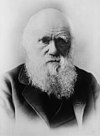 | Biologist and naturalist. Originator of the theory of evolution through natural selection and author of On the Origin of Species. | Andrew Marr, journalist and TV presenter.[12] | [13] |
| 5 | William Shakespeare |  | Poet and playwright. Creator of Hamlet, Macbeth, Romeo and Juliet, and many more. Thought of by many as the greatest of all English-language writers. An influential figure in theatre, his plays have been performed more often than those of any other playwright. His work is praised for its humanity, diversity, psychological depth and countless new words and expressions which have become part of the English language. | Fiona Shaw, actress and theatre and opera director.[12] | [13] |
| 6 | Sir Isaac Newton | 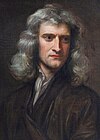 | Physicist, mathematician, astronomer, theologian and natural philosopher. Originator of universal gravitation and laws of classical mechanics and laws of motion. His Principia is one of the most influential works in the history of science. | Tristram Hunt, historian.[12] | [13] |
| 7 | Elizabeth I |  | Queen of England and Ireland. (1558–1603). Brought a period of relative internal stability. She is associated with the defeat of the Spanish Armada. Her reign is known as the Elizabethan era. | Michael Portillo, journalist and politician.[12] | [13] |
| 8 | John Lennon | 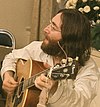 | Pop/rock singer-songwriter, musician, activist and member of music quartet The Beatles. One of the most famous, successful, influential, covered and admired pop artists of all time. Hailed for his highly personal and experimental music, rebellious free-spirited attitude and peace activism. | Alan Davies, comedian and actor.[12] | [13] |
| 9 | Vice-Admiral Horatio Nelson, 1st Viscount Nelson |  | Naval commander, famous for his service in the Royal Navy, particularly during the Napoleonic Wars. His victory during the Battle of Trafalgar was significant in preventing an invasion by Napoleon Bonaparte's army. | Lucy Moore, historian.[12] | [13] |
| 10 | Oliver Cromwell |  | 1st Lord Protector of the Commonwealth of England, Scotland and Ireland (1653–1658). Commander of the New Model Army during the English Civil War against King Charles I. Admired for moving the country to a more democratic stateform, though his nomination was controversial due to allegations of genocide in Ireland. | Richard Holmes, military historian.[12] | [13] |
Full list
- Sir Winston Churchill
- Isambard Kingdom Brunel
- Diana, Princess of Wales
- Charles Darwin
- William Shakespeare
- Sir Isaac Newton
- Elizabeth I
- John Lennon
- Horatio Nelson, 1st Viscount Nelson
- Oliver Cromwell
Sir Ernest Shackleton, explorer. Made important contributions to the exploration of Antarctica.
Captain James Cook, explorer. Made maps of Newfoundland prior to making three voyages to the Pacific Ocean, during which he achieved the first recorded European contact with the eastern coastline of Australia and the Hawaiian Islands, and the first recorded circumnavigation of New Zealand.
Robert Baden-Powell, soldier and activist. Founder of Scouting.
Alfred the Great, king of Wessex (871–899). Successfully stopped the Viking advance in England, encouraged education, proposing that primary education be taught in English, and improved his kingdom's legal system, military structure and people's quality of life.
Arthur Wellesley, 1st Duke of Wellington, general during the Napoleonic Wars (defeated Napoleon at Waterloo) and Prime Minister (1828–1830, 1834).
Margaret Thatcher, Prime Minister (1979–1990). First woman to have held the office.
Michael Crawford, TV, film and theatre actor (Some Mothers Do 'Ave 'Em on television, and originated the title role in The Phantom of the Opera on the West End).
Queen Victoria, queen (1837–1901). Her reign is known as the Victorian era.
Sir Paul McCartney, musician (The Beatles).
Sir Alexander Fleming, physician and chemist. Discovered penicillin. Received the Nobel Prize in Physiology or Medicine in 1945.
Alan Turing, mathematician and pioneering computer scientist. Invented the Turing Test and devised cryptanalytical techniques, including those which cracked the Enigma machine.
Michael Faraday, physicist. Discovered electromagnetic induction, diamagnetism and electrolysis.
Owain Glyndŵr, Welsh ruler, the last native "prince of Wales"
Elizabeth II, queen (1952–).
Stephen Hawking, astrophysicist. Achieved groundbreaking work in the field of quantum gravity and theoretical cosmology. Author of A Brief History of Time.
William Tyndale, scholar. Translated the Bible into English.
Emmeline Pankhurst, activist for women's rights. Helped achieve women's right to vote in the United Kingdom.
William Wilberforce, politician and activist. Led the anti-slavery movement.
David Bowie, musician (Space Oddity, Ziggy Stardust, Heroes, Let's Dance)
Guy Fawkes, member of the Gunpowder Plot. Tried but failed to blow up the English Parliament. The event is the origin of the annual Bonfire Night.
Leonard Cheshire, military pilot and philanthropist.
Eric Morecambe, comedian and actor (Morecambe and Wise).
David Beckham, association football player.
Thomas Paine, philosopher (The Age of Reason).
Boudica, Celtic queen of Britannia. Led resistance against the Roman army.
Sir Steve Redgrave, rower. Won gold medals at five consecutive Olympic Games (1984–2000).
Sir Thomas More, author and philosopher (Utopia).
William Blake, poet and painter (Songs of Innocence and Experience, Jerusalem: The Emanation of the Giant Albion, Milton: A Poem in Two Books).
John Harrison, inventor of the marine chronometer.
Henry VIII, king (1509–1547).
Charles Dickens, novelist (Oliver Twist, A Christmas Carol, Great Expectations, David Copperfield).
Sir Frank Whittle, engineer and inventor. Invented the turbojet engine.
John Peel, radio presenter.
John Logie Baird, engineer and inventor. Invented the television.
Aneurin Bevan, politician. Minister of Health (1945–1951). Spearheaded the establishment of the National Health Service, providing medical care to all UK citizens regardless of wealth.
Boy George, pop singer (Culture Club).
Sir Douglas Bader, military aviator.
Sir William Wallace, knight and resistance leader during the Wars of Scottish Independence.
Sir Francis Drake, explorer and captain. Helped defeat the Spanish Armada under Lord Howard.
John Wesley, religious activist. Founder of Methodism.
King Arthur, mythical king.
Florence Nightingale, humanitarian activist and founder of modern nursing. Nursed wounded soldiers during the Crimean War.
T. E. Lawrence, better known as "Lawrence of Arabia", soldier and author of Seven Pillars of Wisdom.
Robert Falcon Scott, explorer. Failed to reach the South Pole before Roald Amundsen and died on the way back. Became a national hero to the British because of his perseverance.
Enoch Powell, politician.
Sir Cliff Richard, pop singer.
Alexander Graham Bell, inventor. Invented the telephone.
Freddie Mercury, rock singer (Queen) Born in Zanzibar of Indian Parsi descent.
Dame Julie Andrews, film actress (Mary Poppins, The Sound of Music).
Sir Edward Elgar, composer (Pomp and Circumstance Marches).
Queen Elizabeth The Queen Mother, queen during WWII.
George Harrison, rock guitarist (The Beatles).
Sir David Attenborough, biologist and TV documentary presenter.
James Connolly, activist, politician and Marxist insurgent leader.
George Stephenson, civil engineer. "Father of the Railways". Invented the first practical steam locomotive and built the first public railway.
Sir Charlie Chaplin, comedian, actor and film director (The Kid, The Gold Rush, City Lights, The Great Dictator, Modern Times)
Tony Blair, Prime Minister (1997–2007).
William Caxton, printer. Introduced the printing press in England.
Bobby Moore, association football player. Captain of the England team that won the 1966 World Cup
Jane Austen, novelist (Pride and Prejudice, Sense and Sensibility).
William Booth, humanitarian activist. Founder of the Salvation Army.
Henry V, king (1413–1422). Against all odds defeated the French at the Battle of Agincourt.
Aleister Crowley, poet, novelist and occultist.
Robert the Bruce, king of the Scots (1306–1329).
Bob Geldof, pop singer (The Boomtown Rats) and humanitarian activist (Live Aid, Live 8). Born in Dún Laoghaire and not actually British.
The Unknown Warrior, soldier whose remains are buried at Westminster Abbey.
Robbie Williams, pop singer (Take That).
Edward Jenner, physician. Inventor of the smallpox vaccine.
David Lloyd George, 1st Earl Lloyd George of Dwyfor, Prime Minister (1916–1922).
Charles Babbage, mathematician, philosopher, mechanical engineer and inventor. Invented the first programmable mechanical computer.
Geoffrey Chaucer, poet (The Canterbury Tales).
Richard III, king (1483–1485).
J. K. Rowling, novelist (Harry Potter).
James Watt, inventor. Improved the steam engine, making it economical for use in factories, which was fundamental to the Industrial Revolution which originated in Great Britain
Sir Richard Branson, businessman (Virgin).
Bono, rock singer (U2). Born in Dublin, Ireland, and is not British.
John Lydon (Johnny Rotten), rock/punk singer (The Sex Pistols, Public Image Ltd.)
Bernard Law Montgomery, 1st Viscount Montgomery of Alamein ('Monty'), WWII general.
Donald Campbell, speed record breaker. Only person to set both world land and water speed records in the same year (1964).
Henry II, king (1154–1189). Born in Le Mans, France. Although King of England (as well as many other titles), not actually British.
James Clerk Maxwell, physicist. Developed the theory of electromagnetic radiation.
J. R. R. Tolkien, novelist (The Hobbit, Lord of the Rings).
Sir Walter Raleigh, Explorer. Explored in central America and sent expeditions to North America.
Edward I, king (1272–1307). The "Hammer of the Scots". Edward turned the longbow into England's most deadly weapon against the Scottish and French with devastating results, most notably at the Battle of Falkirk.
Sir Barnes Wallis, engineer and inventor. Invented the bouncing bomb, earthquake bomb and geodetic airframe.
Richard Burton, theatre and film actor.
Tony Benn, politician.
David Livingstone, explorer. Discovered the origins of the Nile.
Sir Tim Berners-Lee, computer scientist. Inventor of the World Wide Web.
Marie Stopes, eugenicist and campaigner for women's rights. Pioneer in the field of birth control.
Although the BBC's original ranked list has been removed from their web server and what remains is only an alphabetical list of the Top 100,[15] several other sources have preserved the original ranked list.[16][17][18]
There was some question as to whether the Richard Burton listed at #96 was the actor or the explorer. A BBC press release makes clear that the actor was intended.[19]
See also
- Historical rankings of Prime Ministers of the United Kingdom
100 Worst Britons, made as a spin-off by Channel 4 in 2003
References
^ "100 great British heroes". BBC News. 21 August 2002..mw-parser-output cite.citationfont-style:inherit.mw-parser-output .citation qquotes:"""""""'""'".mw-parser-output .citation .cs1-lock-free abackground:url("//upload.wikimedia.org/wikipedia/commons/thumb/6/65/Lock-green.svg/9px-Lock-green.svg.png")no-repeat;background-position:right .1em center.mw-parser-output .citation .cs1-lock-limited a,.mw-parser-output .citation .cs1-lock-registration abackground:url("//upload.wikimedia.org/wikipedia/commons/thumb/d/d6/Lock-gray-alt-2.svg/9px-Lock-gray-alt-2.svg.png")no-repeat;background-position:right .1em center.mw-parser-output .citation .cs1-lock-subscription abackground:url("//upload.wikimedia.org/wikipedia/commons/thumb/a/aa/Lock-red-alt-2.svg/9px-Lock-red-alt-2.svg.png")no-repeat;background-position:right .1em center.mw-parser-output .cs1-subscription,.mw-parser-output .cs1-registrationcolor:#555.mw-parser-output .cs1-subscription span,.mw-parser-output .cs1-registration spanborder-bottom:1px dotted;cursor:help.mw-parser-output .cs1-ws-icon abackground:url("//upload.wikimedia.org/wikipedia/commons/thumb/4/4c/Wikisource-logo.svg/12px-Wikisource-logo.svg.png")no-repeat;background-position:right .1em center.mw-parser-output code.cs1-codecolor:inherit;background:inherit;border:inherit;padding:inherit.mw-parser-output .cs1-hidden-errordisplay:none;font-size:100%.mw-parser-output .cs1-visible-errorfont-size:100%.mw-parser-output .cs1-maintdisplay:none;color:#33aa33;margin-left:0.3em.mw-parser-output .cs1-subscription,.mw-parser-output .cs1-registration,.mw-parser-output .cs1-formatfont-size:95%.mw-parser-output .cs1-kern-left,.mw-parser-output .cs1-kern-wl-leftpadding-left:0.2em.mw-parser-output .cs1-kern-right,.mw-parser-output .cs1-kern-wl-rightpadding-right:0.2em (contains the top 100, sorted alphabetically)
^ "BBC reveals 100 great British heroes". BBC News. 22 August 2002.
[permanent dead link]
^ "Ten greatest Britons chosen". BBC News. 20 October 2002.
[permanent dead link]
^ Bloomfield, Steve (29 February 2004). "Rebel 'plot' to topple greatest Welshman". The Independent. Retrieved 11 January 2018.
^ Winnett, Robert (20 October 2002). "Three lead race to be greatest Briton". The Times. Retrieved 11 January 2018.
^ ab "Churchill leads great Britons poll". Daily Mail. 23 November 2002. Retrieved 13 March 2013.
^ "Brunel reads from Shakespeare's The Tempest". ITV News. 27 July 2012. Retrieved 24 August 2012.
^ "Timothy Spall plays Churchill at closing ceremony". BBC News. 16 January 2013. Retrieved 24 August 2012.
^ Friar, Karen (28 July 2012). "Web inventor Tim Berners-Lee stars in Olympics opening ceremony". ZDNet. Retrieved 10 April 2013.
^ "Nurse named greatest black Briton". BBC News. 10 February 2004. Retrieved 23 March 2015.
^ Solambey F. "The 100 greatest Black Britons". Afrokanlife. Archived from the original on 30 March 2015. Retrieved 27 March 2015.
^ abcdefghij "BBC TWO reveals the ten greatest Britons of all time" (Press release). BBC. 19 October 2002. Retrieved 11 October 2015.
^ abcdefghij "Great Britons". BBC History. Archived from the original on 4 February 2004. Retrieved 11 October 2015.
^ "Why the Industrial Revolution Happened Here". BBC. 10 July 2017.
^ "The complete list of the top 100 in alphabetical order" (Press release). BBC. 21 August 2002.
^ "100 Greatest Britons (BBC Poll, 2002)". Alchemipedia. 8 December 2009.
^ "Great Britons 1-10". BBC. Archived from the original on 2004-02-04. Retrieved 1 August 2012.
^ "Great Britons 11-100". BBC. Archived from the original on 2002-12-04. Retrieved 1 August 2012.
^ "BBC TWO reveals the nation's top 100 Greatest Britons of all time" (Press release). BBC. 21 August 2002.
External links
Great Britons on IMDb- Churchill memorial press release
- BBC Great Britons press release
BBC Great Britons book and links at National Portrait Gallery
The Top 100 Great Britons - places 11 to 100 by rank — BBC (via web archive)